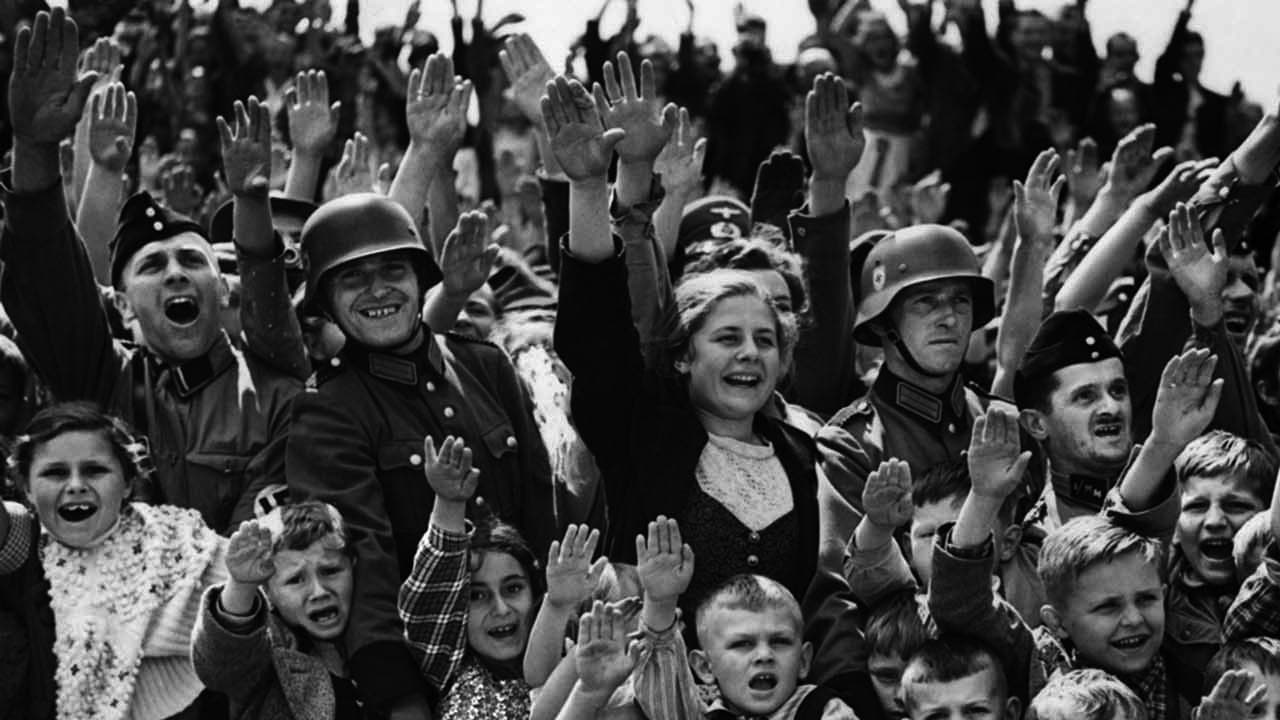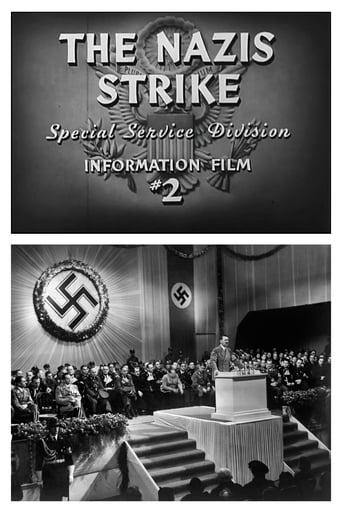

Surprisingly incoherent and boring
... View MoreAn Exercise In Nonsense
... View MoreYes, absolutely, there is fun to be had, as well as many, many things to go boom, all amid an atmospheric urban jungle.
... View MoreWhile it doesn't offer any answers, it both thrills and makes you think.
... View More"The Nazis Strike" is an American black-and-white documentary from 1943, so this one has its 75th anniversary next year and it summarizes basically the events that led to Britain's declaration of war against Nazi Germany. There is some focus on Nazi movements outside Germany too, some focus on Hitler's tactics and how he tried to unsuccessfully avoid a war at two fronts, and raw uncensored footage showing the evils of war. It is original footage from start to finish and the names who made this were actually among America's most successful filmmakers, such as multiple Oscar winner Frank Capra or multiple Oscar nominee Anatole Litvak. The script is a combination by the writers of Casablanca and Lassie. Quite a mix huh? But I am not surprised it is a successful film and still very well-known today so long after its release. It is a fairly decent summary of the political events going on back then, maybe nothing to impress historians or teach them anything new, but everybody with an interest in the years of World War II and not just the American involvement can give it a go. Then again, this is 100% propaganda, so it is actually all about the American involvement. You know what I mean. The significance of this work is also shown by the fact that it got introduced in the National Film Registry. Go watch these 41 minutes. I'm sure you won't be disappointed, unless you really don#t care about the subject at all.
... View More*Spoiler/plot- 1943, A documentary showing the condition and context of the world that allowed the world's aggressors to take a stronghold and keep it until world war arrived to change that injustice.*Special Stars- Director: Frank Capra *Theme- National Socialism or Natzis are not to be trusted.*Trivia/location/goofs- The second film in Frank Capra's 'Why We fight" series.*Emotion- An enjoyable documentary made up of live action combat or newsreel footage. However, there are the unpleasant shots of injured Americans and killed Germans. But it is extremely educational and does what a narrative simulated war film can do.
... View MoreIt's a roughly accurate account of Hitler's build up of Germany's armed forces, in violation of the Treaty of Versailles that ended the first world war, and how Hitler used threats, diplomacy, and military might to acquire the Rhineland, Austria, Czechoslovakia, and Poland.Until his invasion of Poland, the rest of the Allied countries allowed him to wheedle and lie his way across an awful lot of territory without firing a shot. Daladier and Neville Chamberlain accepted Hitler's written promise that, after Czechoslovakia, he wanted to more territory. Most of us have seen poor humiliated Chamberlain waving the Munich treaty and proclaiming "peace in our time." In some ways, the Munich accords were the worst thing that happened during that lead up to the war because, since then, no country has EVER initiated a conflict against an adversary without invoking Chamberlain and Munich.What were Chamberlain's and Daladier's options? Could we have avoided World War if Chamberlain, instead of signing the Munich agreement, had immediately declared war on Germany? In gambling on Hitler's willingness to keep his word, and losing, Chamberlain provided the rest of us with an unshakable historic argument against "appeasement," which has managed to contaminate the concept of negotiations ever since. When offended, never appease, just attack.You can make documentary movies that aren't slanted. I've seen training films on the assembly and maintenance of the M-1 rifle. But propaganda movies are an interesting genre in their own right, blending as they do entertainment with slanted information.This example isn't particularly artful. It's not Leni Riefenstahl's "Triumph of the Will." But, with graphics provided by the Walt Disney Studio, it can hardly go wrong. You can watch the black blot of Germany in central Europe spread its tentacles over the rest of the continent, gobbling it up like an octopus.The film has the usual proletarian propaganda techniques. A voice over with an abominable German accent says, "Vot do vee care about dzah rest of dzah worlt? Ve vant all off it!" Short, simple, out-of-context quotes are taken from speeches by Nazi officials and from "Mein Kampf." And every parade has the Nazis goose stepping.But that's all expectable. The enemy is demonized and called names like "thugs" and "butchers." What's more interesting in propaganda is what's left out.Example: After demolishing Poland's horse cavalry and the city of Warsaw, Germany occupied all of western Poland. (No mention ever of the Warsaw uprising.) Then the Soviet Union waltzed in and took over the EASTERN half of Poland, promptly signing a non-aggression pact with the Germans. How did that come to pass? Well, it's all very simple, according to this film. Hitler HAD to stop because he didn't want to open a second front against Russia, and Stalin agreed because he needed time to build up his armed forces. Easy to grasp, but it doesn't tell us why the Soviet Union occupied eastern Poland in the first place. The Poles, by the way, lacked nothing in elan. Many who escaped fought bravely as units of the RAF, and it was Polish troops who finally managed to occupy Monte Casino in Italy after all the Allies had suffered massive casualties.Also missing is any mention of military tactics. That the Germans outnumbered in men and equipment all of the enemies they fought is established early on. But of course that's not the whole answer. I don't think the word "Blitzkrieg" is used but that subject may be saved for Part 2.But that's the problem with all propaganda. It's like a witness in court who tells nothing but the truth, but not the whole truth. It can provide an effective pep talk but, in its selective presentation of facts, it can also be extremely dangerous.
... View MoreNazis Strike, The (1943) ** 1/2 (out of 4) Part two of a seven film series taking a look at WW2. The film was produced by the American government so there's plenty of flag waving and the documentary is certainly one sided but that's to be expected since it's goal was to get people behind the war. It's a bit too over-dramatic for its own good but various executions and other deaths are quite disturbing to see. These real death scenes are something that were in a lot of this WW2 shorts. All of the Capra directed films are worth seeing as are the WW2 shorts by John Ford.
... View More